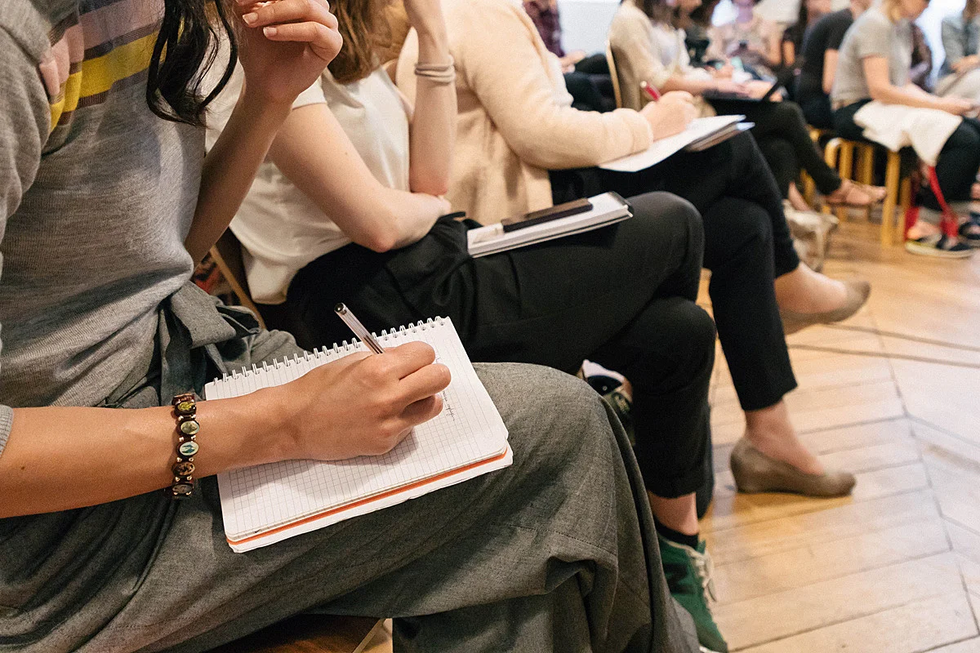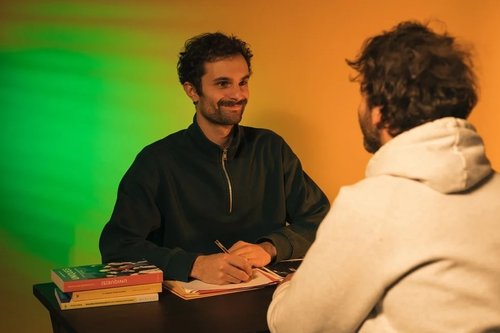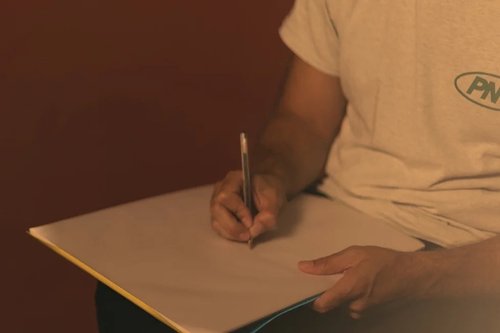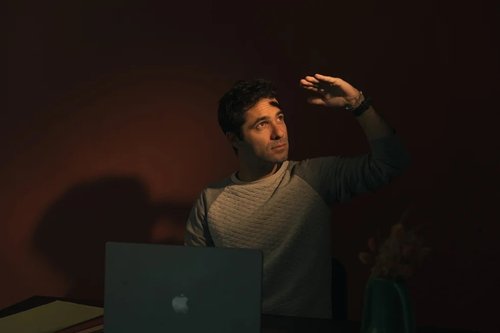Group interviews: how to excel and shine
May 12, 2022
5 mins


Freelance Content Creator
Just as its name suggests, a group interview is an interview where various candidates take part at the same time. So far so good, right? But do you actually know what’s expected of you in these types of interviews, which are becoming increasingly popular in recruitment? Should you prepare for them the same way you would for an individual interview? Whether you’ve got some experience with this type of situation or you’re a bit lost, here is everything you need to ace your group interview.
Companies are facing a recurring problem: a lot of candidates have similar educational backgrounds and experiences. That’s why so many businesses are opting to supplement individual interviews with other tests that can provide additional information. This is the case with group interviews, which have been specifically designed to explore the mindset and skills that are needed for the position in question.
What is a group interview?
This type of interview gathers a group of candidates – typically between five and ten – to debate an issue or solve a problem together for a set amount of time – usually about 30 to 45 minutes – and then come to a conclusion in a harmonious and respectful manner.
A group interview will allow the interviewer to learn some valuable information about the candidates. Likewise, for you, there are also many benefits:
- getting to meet other candidates with similar profiles
- seeing how you behave when put to the test
- evaluating your skills
- interacting with your competitors
What sectors use group interviews?
Group interviews are particularly used for sales-related roles and ones set in commercial settings such as big supermarket chains and franchised clothing stores. They are often used in sectors such as retail, insurance, consultancy, and hotels. They are also common in sectors that are on the lookout for tech staff with innovation skills.
What are companies looking for?
Companies doing such interviews are looking for:
- dynamic and focused people
- those who can solve problems
- qualified candidates who can hit targets
What can you expect from a group interview?
At the beginning of the interview, the recruiter will explain the main instructions and any relevant information to the candidates. In these challenges, there are often several observers, who jot down and evaluate factors such as a candidate’s contribution, behavior, and non-verbal language, to determine whether they’d be a good fit for the role.
Once everyone is clear about the instructions, the observers will fade into the background and leave the candidates to their own devices to see how they cope and how they tackle the task at hand. In group interviews, two types of dynamics are often used.
1. Verbal reasoning
With this type of approach, you will have to argue and persuade your counterparts of your position. In such interviews, the following is evaluated:
- the clarity in the delivery and development of your arguments
- how they are presented (whether you do this in a structured manner or not)
- knowledge related to the post in question
- creativity
- body language
A group interview with such dynamics can have different formats:
- Forum: This consists of a group presentation about a topic chosen by the recruiters in which each candidate contributes.
- Round table: With this method, the idea is for the group to find common ground. Remember that this is a discussion and not just a show of ideas. Therefore, it’s very important to respect everyone’s turn and actively listen to the proposals put forward by your counterparts.
- Panel: In this case, the aim is for the group to present an issue and tackle it from different points of view, for example, considering how it would affect the different areas of the company.
- Debate: The aim here is to address an issue from opposing positions. The recruiter will give a stance to each candidate and will ask them to argue that point of view.
- Brainstorm: You’re no doubt already familiar with this technique, where the aim is to openly and spontaneously express ideas regarding a certain issue. It’s important here to throw ideas out there. Originality is highly valued in this evaluation.
2. Strategy
This approach consists of solving an imaginary issue or a real problem that the candidate could come across. The recruiters will evaluate to what extent you’re able to handle a crisis in a short space of time while staying calm and adopting an empathetic mindset with the other candidates.
The company is looking to see your leadership skills and your ability to handle a crisis and solve it adequately. This is why it will be highly valued If you know how to:
- provide an overview of the problem
- negotiate with flexibility
- make decisions in an agile and resolute manner
How to prepare for a group interview
Pre-interview
You may be facing your first group interview, but this doesn’t mean you can’t turn up well prepared. Here’s how to get ready for a group interview:
- Ask questions: Try to speak with the recruiter and find out the format of the activities or the style of questions that you could be asked. Even if they don’t give you a lot of information (given spontaneity is one of the keys to these sorts of interviews), they can guide you.
- Read up about the company: Check out its web page, its blog, and any articles about it in the press in print and online. If you have the chance, you can also ask the staff about the company culture. This way, during the interview, you can show you’re familiar with the company.
- Ideas, ideas, and more ideas: Prepare a selection of points that could help you to propose ideas that promote the company’s values or its business. This way, you will stand out for your initiative, creativity, and innovation, and you’ll avoid going blank on the day.
The day of
- Dress accordingly: Wear an outfit that suits the post you’re applying for. Use common sense. Your talent is ultimately the most important thing here but first impressions count too.
- Punctuality: “Five minutes early is on time, on time is late.” Remember this saying because it will allow you to evaluate and speak with the other candidates in a more informal setting while waiting for the interview to start.
- Remember your place: You may well get on with someone from the very first second of the interview, but don’t forget that it’s the recruiter who decides and is in control. This is a job interview – not a bunch of friends hanging out.
- Actively listen: Don’t try to outshine others or belittle their ideas, opinions, or points of view. Instead, actively listen and show your willingness to work as part of a team and understand the different opinions to reach the solution needed.
- Get involved: Express your opinion and try to get the other members of the group to contribute constructively to the process – especially those who find it difficult to speak. This way, you will display your ability to work with others and your empathy.
Post-interview
With these types of interviews, it’s common for the recruiter to write up a report about your participation. So they may ask you how you felt during the interview or what parts you found easy or complicated. Try to be honest and proactive. And, once the interview has finished, you can show initiative too:
- Review the encounter: Certain factors can help you gauge whether your interview has gone well or not. Ask yourself, for example, whether you felt at ease, whether you actively participated, whether you let your counterparts speak and whether you listened to them.
- Think about what you can improve on for the next time: You may have felt insecure, in that case, you know that, for your next group interview, you need to work on your confidence.
- Send a thank-you note: Writing a brief email thanking the interviewer is always a great idea. Use this opportunity to mention a key moment from the interview or some personal detail. This will highlight your interest and ensure that you’re remembered.
Finally, remember that if you want to walk out of one of these interviews feeling as if you’ve aced it, the experts advise you to be an active participant but not to dominate the proceedings. The interviewers are looking for you to be proactive and for you to defend your proposals with assertiveness and great arguments. But don’t think that the person speaking the most will be the one selected: listening and considering others’ proposals is highly valued. In a group interview, you have the opportunity to showcase what makes you special, so seize the moment and let your personality shine through.
Photo: Welcome to the Jungle
Translated by Jamie Broadway
Follow Welcome to the Jungle on Facebook on LinkedIn and on Instagram and subscribe to our newsletter to get our latest articles every day!

More inspiration: Prepare for a job interview

Hybrid work goals: How to nail the negotiation in your next job interview
Want a hybrid work setup? Learn how to research, negotiate, and showcase the benefits of flexibility during your next job interview.
Dec 19, 2024

The secret to interview success? That annoying colleague
Got a story about a difficult coworker? Good! That office drama might just be your ticket to acing your next interview.
Dec 16, 2024

Is flexibility the key to “having it all” as a parent?
Balancing a career and parenthood can be challenging, but with the right approach, it’s possible to achieve both.
Oct 08, 2024

Slacker vs. control freak: What’s your interview style?
We’ve all been there: whether you're overly anxious or effortlessly cool—what best describes you?
Sep 24, 2024

Overcoming neurotypical norms during the job hunt
Neurodiverse individuals bring valuable innovation and should be more included in the workplace. How can we embrace their unique talents?
Sep 23, 2024
The newsletter that does the job
Want to keep up with the latest articles? Twice a week you can receive stories, jobs, and tips in your inbox.

Looking for your next job?
Over 200,000 people have found a job with Welcome to the Jungle.
Explore jobs